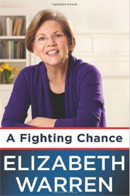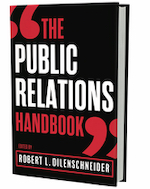The release of Hillary Clinton's Hard Choices and Elizabeth Warren's A Fighting Chance has launched the race to create an image for Democrat primary voters.
 Elizabeth Warren, Massachusetts' senior Senator, came to prominence by fighting banks in the aftermath of the financial crisis of 2008.
Elizabeth Warren, Massachusetts' senior Senator, came to prominence by fighting banks in the aftermath of the financial crisis of 2008.
A Fighting Chance, is a memoir of her youth in Oklahoma, her experience as a law professor at several prestigious schools, including the University of Pennsylvania and Harvard, where she developed her expertise in contract law and bankruptcy.
During her tenure in academia, Warren produced original research into the demographics of bankruptcy. In one of her studies from 2001, she uncovered some eye-opening data including: "More children would live through their parents' bankruptcy than their parents' divorce. More women would file for bankruptcy than would graduate college. More people would file for bankruptcy than would be diagnosed with cancer."
Perhaps the most startling determinant of whether or not they declared bankruptcy was whether or not they had a child.
Books like this one are used by politicians to introduce themselves to larger audiences in preparation for a campaign for higher office. This is no exception. (The left-wing advocacy group, MoveOn.org, is offering it as a fundraising premium).
While she is being touted as a potential challenger to Hillary Clinton for the 2016 Democratic presidential nomination, she seems to be borrowing a page from the 1992 Clinton campaign. In the opening pages, Warren states her primary thesis of the economy: "The game is rigged."
During the early days of the financial crisis, Warren enjoyed the role of political outsider while she was overseeing the federal Troubled Asset Relief Program (TARP). She underscored this by informing the reader she threw up immediately before an interview on The Daily Show with Jon Stewart.
One of Warren's biggest fights was for the establishment of Consumer Financial Protection Board. She got then-Representative Barney Frank (D-MA), who was chairman of the Banking and Financial Services Committee, to add it to the Dodd-Frank financial reform bill. President Obama named Warren the interim director.
In a lesson in Washington politics, she was never given the nomination and never had Senate confirmation. Obama told her that in order to prevent a filibuster over his eventual nominee, he would have to nominate someone else to run the board. The job eventually went to former Ohio attorney general Rich Cordray, who currently holds the position.
President Obama assigned Warren to get the agency established. She explains her fragile relationship with Treasury Secretary Timothy Geithner. [Incidentally, Geithner is currently promoting his own memoir of the financial crisis, Stress Test.] Even though Warren was running the CFPB, she learned a hard lesson of politics -- she would not be nominated to be director of the agency.
Once Warren enters the race to challenge Sen. Scott Brown, who won a special election following the death of liberal lion Ted Kennedy, the book becomes a political whirlwind. She pours on many anecdotes of people who declared their support for her -- people who were unsure about their economic futures, people whose children had college degrees, but bleak prospects for employment.
One of the most telling anecdotes about modern politics occurs when Warren is being questioned by a political consultant as to whether or not anyone in her past would say negative things about her; she explained that her first husband, Jim Warren, had passed away. The consultant exclaimed "Great!," but quickly backtracked.
It is hard to doubt Warren's sincerity and commitment to her beliefs. She is devoted to her husband, her children, grandchildren and her faithful dog Otis.
She portrays her political adversaries Sen. Scott Brown, Rep. Kevin Brady and Sen. Max Baucus as two-dimensional dolts.
Warren also has an abiding faith in government. She tells the reader of the many benign functions of government including infrastructure repair and food safety. Yet she ignores the many breaches of personal privacy Americans have faced during the Obama administration.
Regardless of whether or not Warren enters the race for the 2016 Democratic presidential nomination, those who are interested in her background and worldview will benefit from reading A Fighting Chance.
Kevin P. McVicker is account supervisor with Shirley & Banister Public Affairs in Alexandria, Va.


 Time correspondent Simon Shuster’s “The Showman” demonstrates how Ukraine president Volodymyr Zelensky’s masterful knowledge of PR tactics and the power of propaganda transformed him from comedian into a respected world leader.
Time correspondent Simon Shuster’s “The Showman” demonstrates how Ukraine president Volodymyr Zelensky’s masterful knowledge of PR tactics and the power of propaganda transformed him from comedian into a respected world leader. Iuliia Mendel, who served as press secretary for Ukraine president Volodymyr Zelensky from 2019 to 2021, will release a book called “The Fight Of Our Lives” in September, published by Simon & Schuster’s One Signal Publishers.
Iuliia Mendel, who served as press secretary for Ukraine president Volodymyr Zelensky from 2019 to 2021, will release a book called “The Fight Of Our Lives” in September, published by Simon & Schuster’s One Signal Publishers. Robert Dilenschneider, former CEO of Hill and Knowlton, is releasing the fifth edition of The Public Relations Handbook on Feb. 15.
Robert Dilenschneider, former CEO of Hill and Knowlton, is releasing the fifth edition of The Public Relations Handbook on Feb. 15.  Big Advertising may be down for the count, but the power of marketing lives on. That’s the big takeaway from Paul Dyer’s “Friction Fatigue,” a look at what advertising’s downward spiral means for “future-focused brands."
Big Advertising may be down for the count, but the power of marketing lives on. That’s the big takeaway from Paul Dyer’s “Friction Fatigue,” a look at what advertising’s downward spiral means for “future-focused brands." Sabrina Horn, the high-tech PR guru who sold her Horn Group to Finn Partners in 2015, has published “Make It, Don’t Fake It.”
Sabrina Horn, the high-tech PR guru who sold her Horn Group to Finn Partners in 2015, has published “Make It, Don’t Fake It.”


 Have a comment? Send it to
Have a comment? Send it to 
No comments have been submitted for this story yet.